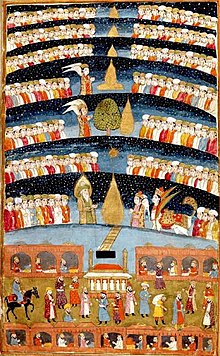Janna

Janna ( Arabic جنّة, DMG ǧanna ) is an Arabic name for paradise in Islam . It is related to the Hebrew term Gan Eden (גן עדן), in other places it is also usedعدن, DMG ʿadn 'Eden' is used, e.g. B. in Sura 20 : 76. Arab opposing concepts to Dschanna are Gehenna ( Hell ) and NAR ( "Hellfire"). According to Islamic theology, Janna is divided into 7 floors, with the highest floors intended for the most devout.
Janna in the Koran
In the Qur'an , Janna is described as the place where God made Adam and Eve dwell at the beginning of times ( Sura 7:19). In addition, it is described in numerous places in the Koran as the otherworldly place of joy that is promised to the elect:
“The paradise that is promised to the God-fearing is such: In its lowlands (w. Below it) streams flow. And it has fruit and shade all the time. That is the ultimate goal of those who are godly. But the ultimate goal of the unbelievers is hellfire. "
“The paradise that is promised to the God-fearing is such: In it there are streams with water that is not rotten, others with milk that (still) tastes unchanged (fresh), others with wine that is a pleasure to drink , and (again) others with purified honey. They (that is, those who fear God) have in it all kinds of fruits and mercy from their Lord. (Are the inmates of such a wonderful paradise about) the same as people who dwell (eternally) in hellfire and get hot water to drink that tears their entrails apart? "
Janna in Islamic theology
Much debated in medieval Islamic theology was the question of whether Adam's paradise is identical to the paradise in which the blessed would also enter at the end of time. While al-Hasan al-Basrī and in his entourage also the founders of the Muʿtazila , Wāsil ibn ʿAtā ' (died 748) and ʿAmr ibn ʿUbaid , taught that this identity was given and that the paradise promised to man existed from the beginning Another theologian, Dirār ibn ʿAmr (d. 796), believed that paradise and hell would not be created until the Last Judgment . Dirār's position was later joined by many other Muʿtazilites such as Hishām al-Fuwatī, ʿAbbād ibn Sulaimān and Abū Hāschim. The opposing side only prevailed after a long struggle.
The question of whether non-Muslims can also get to paradise is controversial among Muslim theologians. Some scholars interpret the Koran passage 2:62 - which Janna announces as a reward for the believers among the people of the book - in such a way that it only refers to those in pre-Islamic times , so that if they do not become Muslims afterwards, they are excluded from access be excluded to paradise. The Sunni scholars Muhammad Abduh and Raschīd Ridā , however, reject this view and refer to the Qur'an 4: 123-124, which says that recognition of the prophecy of Muhammad cannot be made a condition for salvation. In Shiite Iran , people in the book who died for the Iranian side in the First Gulf War are even considered martyrs , which is why the “ Supreme Leader ” Ali Khamenei regularly visits the families of Christian dead at Christmas.
implementation
The garden type of Tschahār Bāgh ("garden divided into four") is said to represent the Islamic paradise.
literature
- Louis Gardet: Art. "Djanna". In: Encyclopaedia of Islam . New Edition. Vol. II., Pp. 447-452.
supporting documents
- ↑ Ursula Spuler-Stegemann : The 101 most important questions. Islam, CH Beck, 2007, p. 43
- ↑ corpuscoranicum
- ↑ corpuscoranicum
- ↑ See Josef van Ess : Theology and Society in the 2nd and 3rd Century of the Hijra. A History of Religious Thought in Early Islam. 6 volumes. De Gruyter, Berlin 1991-1997, here: Volume 3, p. 53 f.
- ↑ a b The Koran, ed., Trans. u. come over. v. Adel Theodor Khoury , Gütersloh 2004, p. 67 (footnote).
- ↑ Shayan Arkian, Markus Fiedler : The so-called head tax does not discriminate against Christians , MultiPerspektivenisch, April 30, 2018.
- ↑ Christ in the Night of Glory. The story of Supreme Leader's presence at the homes of Armenian and Assyrian martyrs in the years 1984 to 2015, 2016, p. 9.
- ↑ Annemarie Schimmel 1976. The Celestial Garden in Islam. In: Elisabeth B. MacDougall, R. Ettinghausen (Eds.), The Islamic Garden, Washington, Dumbarton Oaks